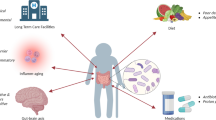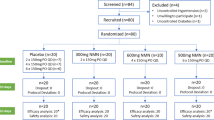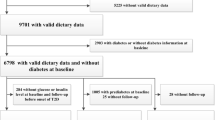Abstract
Purpose
The connection between gut microbiota imbalance, inflammation and its role in the pathogenesis of metabolic syndrome (MetS) clustering factors has been increasingly recognized. However, data on the efficacy of probiotics supplementation on MetS components are few and almost lacking in the elderly. To address this issue, we conducted a randomized, double-blind, placebo-controlled, parallel-group, clinical study on a large sample of MetS elderly patients.
Methods
After 14 days of diet and physical activity standardization, 60 elderly patients were randomized to treatment with a synbiotic formula of Lactobacillus plantarum PBS067, Lactobacillus acidophilus PBS066 and Lactobacillus reuteri PBS072 with active prebiotics or placebo. Patients were evaluated anamnestically and by the execution of a physical examination and laboratory and haemodynamic analyses at the baseline and after 60 days of treatment. At enrollment and at the end of the trial, all enrolled patients complete the EuroQol-5 Dimension (EQ-5D) questionnaire.
Results
Through the 2-month period of treatment, patients who received active treatment experienced a statistically significant improvement in waist circumference and in fasting plasma insulin, total cholesterol, high-density lipoprotein cholesterol, non-HDL-C, triglycerides (TG), low-density lipoprotein cholesterol, high-sensitivity C-reactive protein and tumor necrosis factor alpha serum levels, compared both to the baseline and the control group. Visceral adiposity index improvement in the synbiotic treatment group was significantly greater than in placebo group. Compared to baseline, treatment with synbiotics also significantly reduced mean arterial pressure and fasting plasma glucose.
All treatment groups demonstrated a significant decrease in TG. TG reduction in the synbiotic group was significantly greater than in the control group.
The EQ-5D VAS questionnaire significantly improved only in probiotics-treated subjects.
Conclusion
Treatment with a synbiotic formula of L. plantarum PBS067, L. acidophilus PBS066 and L. reuteri PBS072 with active prebiotics decreased MetS syndrome prevalence, several cardiovascular risk factors and markers of insulin resistance in elderly patients.

Similar content being viewed by others
References
Kiousi DE, Karapetsas A, Karolidou K, Panayiotidis MI, Pappa A, Galanis A (2019) Probiotics in extraintestinal diseases: current trends and new directions. Nutrients 11(4):E788. https://doi.org/10.3390/nu11040788
Ezzaidi N, Zhang X, Coker OO, Yu J (2019) New insights and therapeutic implication of gut microbiota in non-alcoholic fatty liver disease and its associated liver cancer. Cancer Lett 459:186–191. https://doi.org/10.1016/j.canlet.2019.114425
Scott KP, Antoine JM, Midtvedt T, van Hemert S (2015) Manipulating the gut microbiota to maintain health and treat disease. Microb Ecol Health Dis 26:25877. https://doi.org/10.3402/mehd.v26.25877
Santos-Marcos JA, Perez-Jimenez F, Camargo A (2019) The role of diet and intestinal microbiota in the development of metabolic syndrome. J Nutr Biochem 70:1–27. https://doi.org/10.1016/j.jnutbio.2019.03.017
Engin A (2017) The definition and prevalence of obesity and metabolic syndrome. Adv Exp Med Biol 960:1–17. https://doi.org/10.1007/978-3-319-48382-5_1
Ju SY, Lee JY, Kim DH (2017) Association of metabolic syndrome and its components with all-cause and cardiovascular mortality in the elderly: a meta-analysis of prospective cohort studies. Medicine (Baltimore) 96(45):e8491. https://doi.org/10.1097/MD.0000000000008491
Cicero AFG, Fogacci F, Giovannini M, Grandi E, Rosticci M, D'Addato S, Borghi C (2018) Serum uric acid predicts incident metabolic syndrome in the elderly in an analysis of the Brisighella heart study. Sci Rep 8(1):11529. https://doi.org/10.1038/s41598-018-29955-w
Sales MC, Oliveira LP, Liberalino LCP, Cunha ATO, Sousa SES, Lemos TMAM, Lima SCVC, Lima KC, Sena-Evangelista KCM, Pedrosa LFC (2018) Frequency of metabolic syndrome and associated factors in institutionalized elderly individuals. Clin Interv Aging 13:2453–2464. https://doi.org/10.2147/CIA.S177731
Kuk JL, Ardern CI (2010) Age and sex differences in the clustering of metabolic syndrome factors: association with mortality risk. Diabetes Care 33(11):2457–2461. https://doi.org/10.2337/dc10-0942
Miglioranza Scavuzzi B, Miglioranza LH, Henrique FC, Pitelli Paroschi T, Lozovoy MA, Simão AN, Dichi I (2015) The role of probiotics on each component of the metabolic syndrome and other cardiovascular risks. Expert Opin Ther Targets 19(8):1127–1138. https://doi.org/10.1517/14728222.2015.1028361
Bäckhed F, Ding H, Wang T, Hooper LV, Koh GY, Nagy A, Semenkovich CF, Gordon JI (2004) The gut microbiota as an environmental factor that regulates fat storage. Proc Natl Acad Sci USA 101(44):15718–15723
Turroni S, Brigidi P, Cavalli A, Candela M (2018) Microbiota-host transgenomic metabolism, bioactive molecules from the inside. J Med Chem 61(1):47–61. https://doi.org/10.1021/acs.jmedchem.7b00244
Thushara RM, Gangadaran S, Solati Z, Moghadasian MH (2016) Cardiovascular benefits of probiotics: a review of experimental and clinical studies. Food Funct 7(2):632–642. https://doi.org/10.1039/c5fo01190f
Mazidi M, Rezaie P, Kengne AP, Mobarhan MG, Ferns GA (2016) Gut microbiome and metabolic syndrome. Diabetes Metab Syndr 10(2 Suppl 1):S150–S157. https://doi.org/10.1016/j.dsx.2016.01.024
Salazar N, Valdés-Varela L, González S, Gueimonde M, de Los Reyes-Gavilán CG (2017) Nutrition and the gut microbiome in the elderly. Gut Microbes 8(2):82–97. https://doi.org/10.1080/19490976.2016.1256525
Dong Y, Xu M, Chen L, Bhochhibhoya A (2019) Probiotic foods and supplements interventions for metabolic syndromes: a systematic review and meta-analysis of recent clinical trials. Ann Nutr Metab 74(3):224–241. https://doi.org/10.1159/000499028
Denys K, Cankurtaran M, Janssens W, Petrovic M (2009) Metabolic syndrome in the elderly: an overview of the evidence. Acta Clin Belg 64(1):23–34
Alberti KG, Zimmet P, Shaw J (2006) Metabolic syndrome-a new world-wide definition. A consensus statement from the international diabetes federation. Diabet Med 23(5):469–480
Vellas B, Guigoz Y, Garry PJ, Nourhashemi F, Bennahum D, Lauque S, Albarede JL (1999) The mini nutritional assessment (MNA) and its use in grading the nutritional state of elderly patients. Nutrition 15(2):116–122
Guigoz Y, Vellas B (1995) Test d’evaluation de l’etat nutritionnel de la personne age’e: le mini nutritional assessment (MNA). Med Hyg 53:1965
Cicero AFG, Caliceti C, Fogacci F, Giovannini M, Calabria D, Colletti A, Veronesi M, Roda A, Borghi C (2017) Effect of apple polyphenols on vascular oxidative stress and endothelium function: a translational study. Mol Nutr Food Res. https://doi.org/10.1002/mnfr.201700373
Parikh RM (2011) Limit your waist size to half of your height. Indian J Endocrinol Metab 15(3):228–229. https://doi.org/10.4103/2230-8210.83411
Balestroni G, Bertolotti G (2012) EuroQol-5D (EQ-5D): an instrument for measuring quality of life. Monaldi Arch Chest Dis 78(3):155–159 Italian
Cicero AF, D'Addato S, Reggi A, Reggiani GM, Borghi C (2013) Hepatic steatosis index and lipid accumulation product as middle-term predictors of incident metabolic syndrome in a large population sample: data from the Brisighella heart study. Intern Emerg Med 8(3):265–267. https://doi.org/10.1007/s11739-012-0875-9
Cicero AFG, Fogacci F, Morbini M, Colletti A, Bove M, Veronesi M, Giovannini M, Borghi C (2017) Nutraceutical effects on glucose and lipid metabolism in patients with impaired fasting glucose: a pilot, double-blind, placebo-controlled, randomized clinical trial on a combined product. High Blood Press Cardiovasc Prev 24(3):283–288. https://doi.org/10.1007/s40292-017-0206-3
Levey AS, Stevens LA, Schmid CH, Zhang YL, Castro AF 3rd, Feldman HI, Kusek JW, Eggers P, Van Lente F, Greene T, Coresh J, CKD-EPI (Chronic Kidney Disease Epidemiology Collaboration) (2009) A new equation to estimate glomerular filtration rate. Ann Intern Med 150(9):604–612
Cicero AFG, Gitto S, Fogacci F, Rosticci M, Giovannini M, D'Addato S, Andreone P, Borghi C, Brisighella Heart Study Group Medical, and Surgical Sciences Dept., University of Bologna (2018) Fatty liver index is associated to pulse wave velocity in healthy subjects: data from the Brisighella heart study. Eur J Intern Med 53:29–33. https://doi.org/10.1016/j.ejim.2018.03.010
Amato MC, Giordano C, Galia M, Criscimanna A, Vitabile S, Midiri M, Galluzzo A, AlkaMeSy Study Group (2010) Visceral adiposity index: a reliable indicator of visceral fat function associated with cardiometabolic risk. Diabetes Care 33(4):920–922. https://doi.org/10.2337/dc09-1825
Williams B, Mancia G, Spiering W, AgabitiRosei E, Azizi M, Burnier M, Clement DL, Coca A, de Simone G, Dominiczak A, Kahan T, Mahfoud F, Redon J, Ruilope L, Zanchetti A, Kerins M, Kjeldsen SE, Kreutz R, Laurent S, Lip GYH, McManus R, Narkiewicz K, Ruschitzka F, Schmieder RE, Shlyakhto E, Tsioufis C, Aboyans V, Desormais I, ESC Scientific Document Group (2018) 2018 ESC/ESH guidelines for the management of arterial hypertension. Eur Heart J 39(33):3021–3104. https://doi.org/10.1093/eurheartj/ehy339
Cicero AFG, Fogacci F, Veronesi M, Grandi E, Dinelli G, Hrelia S, Borghi C (2018) Short-term hemodynamic effects of modern wheat products substitution in diet with ancient wheat products: a cross-over randomized clinical trial. Nutrients 10(11):E1666. https://doi.org/10.3390/nu10111666
Day LM, Maki-Petaja KM, Wilkinson IB, McEniery CM (2013) Assessment of brachial artery reactivity using the endocheck: repeatability, reproducibility and preliminary comparison with ultrasound. Artery Res 7(3–4):119–120
McGreevy C, Barry M, Bennett K, Williams D (2013) Repeatability of the measurement of aortic pulse wave velocity (aPWV) in the clinical assessment of arterial stiffness in communitydwelling older patients using the Vicorder device. Scand J Clin Lab Invest 73(4):269–273. https://doi.org/10.3109/00365513.2013.770162
Patti AM, Al-Rasadi K, Giglio RV, Nikolic D, Mannina C, Castellino G, Chianetta R, Banach M, Cicero AFG, Lippi G, Montalto G, Rizzo M, Toth PP (2018) Natural approaches in metabolic syndrome management. Arch Med Sci 14(2):422–441. https://doi.org/10.5114/aoms.2017.68717
Mu Q, Tavella VJ, Luo XM (2018) Role of lactobacillus reuteri in human health and diseases. Front Microbiol 9:757. https://doi.org/10.3389/fmicb.2018.00757
Markowiak P, Śliżewska K (2017) Effects of probiotics, prebiotics, and synbiotics on human health. Nutrients 9(9):E1021. https://doi.org/10.3390/nu9091021
Roberfroid MB (1682S) Prebiotics and probiotics: are they functional foods? Am J Clin Nutr 71(6 Suppl):1682S–S1687. https://doi.org/10.1093/ajcn/71.6.1682S
Altieri C, Iorio MC, Bevilacqua A, Sinigaglia M (2016) Influence of prebiotics on Lactobacillus reuteri death kinetics under sub-optimal temperatures and pH. Int J Food Sci Nutr 67(2):92–98. https://doi.org/10.3109/09637486.2015.1136905
Pan X, Wu T, Zhang L, Cai L, Song Z (2009) Influence of oligosaccharides on the growth and tolerance capacity of lactobacilli to simulated stress environment. Lett Appl Microbiol 48(3):362–367. https://doi.org/10.1111/j.1472-765X.2008.02539.x
Scheid MM, Genaro PS, Moreno YM, Pastore GM (2014) Freeze-dried powdered yacon: effects of FOS on serum glucose, lipids and intestinal transit in the elderly. Eur J Nutr 53(7):1457–1464. https://doi.org/10.1007/s00394-013-0648-x
Ferrarese R, Ceresola ER, Preti A, Canducci F (2018) Probiotics, prebiotics and synbiotics for weight loss and metabolic syndrome in the microbiome era. Eur Rev Med Pharmacol Sci 22(21):7588–7605. https://doi.org/10.26355/eurrev_201811_16301
Acknowledgements
The study was supported by the University of Bologna Institutional funding. Products were manufactured by Farcoderma S.r.l., Torre Pallavicina (BG), Italy and kindly provided by Amita HC, Solaro (MI), Italy. The authors are sincerely grateful to all the subjects who agreed to participate in this trial.
Author information
Authors and Affiliations
Corresponding author
Ethics declarations
Conflict of interest
No author has any conflict of interest in the publication of this study.
Rights and permissions
About this article
Cite this article
Cicero, A.F.G., Fogacci, F., Bove, M. et al. Impact of a short-term synbiotic supplementation on metabolic syndrome and systemic inflammation in elderly patients: a randomized placebo-controlled clinical trial. Eur J Nutr 60, 655–663 (2021). https://doi.org/10.1007/s00394-020-02271-8
Received:
Accepted:
Published:
Issue Date:
DOI: https://doi.org/10.1007/s00394-020-02271-8




